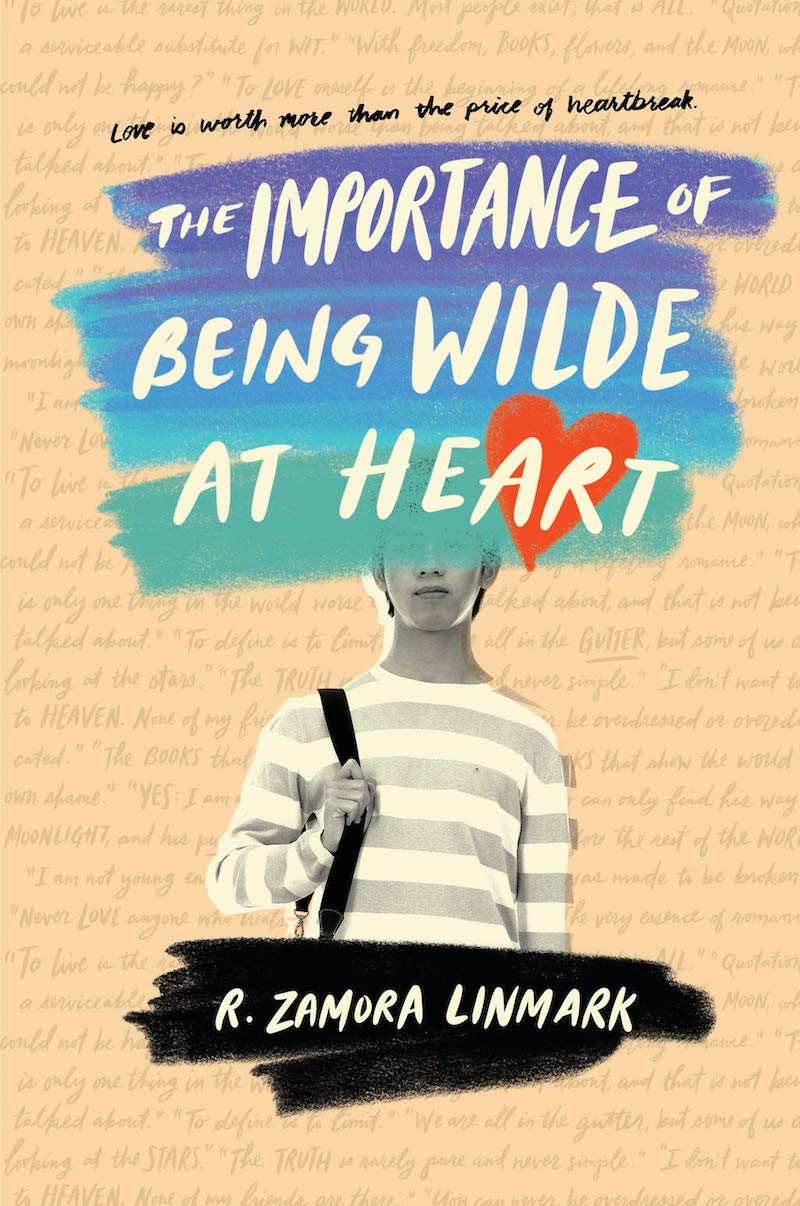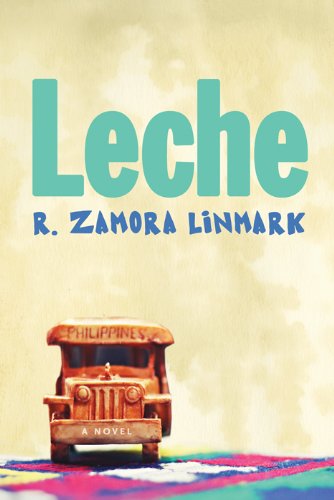An earnest valentine
This book is about love. There are hearts on the cover, like emojis. One on the front and three on the back. Like a valentine. There’s an author photo of Linmark with his dog, both with big grins. Unabashed about love.
There are also the words “Love is worth more than the price of heartbreak,” twice on the cover, once on the front and once on the back, like the first and last lines of a poem.
So, it’s a book about heartbreak. But also love. And very much about Oscar Wilde, the patron saint of rebels and bookworms. Ken Z (Z without a period and with no apparent significance) is one of those bookworms and the seventeen-year-old protagonist of R. Zamora Linmark’s first young adult novel, The Importance of Being Wilde at Heart.
Linmark is a poet, novelist, and playwright. His previous novel, Leche, is a rollicking jaunt through Manila, its protagonist returning to his birthplace through a disorienting series of encounters with oddball characters in a search to reconcile his American and Filipino selves. The third-person narrative is interspersed with tourist tips, postcards, and dictionary entries that interject information about culture and history, and insights into character.
While The Importance of Being Wilde at Heart also contains an intriguing cast of characters and a hybrid narrative, it’s a more introspective, first-person chronicle by Ken Z, a teenager experiencing the first sweet pangs of love and all the complexities that muck it up. One of those complexities is that Ran, the object of Ken Z’s desire, lives in North Kristol, while Ken Z lives in South Kristol, two halves of the same Pacific island nation but separated by political differences and unequal military might. The wealthy, militarized North has no tolerance for gays, and its rigid education system bans books. It also threatens to encroach on the poorly resourced South, intending to build an observatory on Mount Pula, named for the indigenous inhabitants that populated the island before colonization.
Those in the North are free to travel to the South, which is how Ran happens to be at Mirage, “the uppity mall where corrupt politicians, celebrities, and foreign investors reside.” Ken Z is there “bunburying,” that is, assuming a secret identity as an escape from his world and himself. Bunbury is a character in Oscar Wilde’s comedy The Importance of Being Earnest, which Ken Z happens to be reading when Ran approaches him and reveals his own reading material, De Profundis. This tragedy, written while Wilde was in prison for “gross indecency with men,” is covered in brown paper, because Wilde’s books are among those banned in the North.
Ran happens to be a dead ringer for Dorian Gray, the eponymous character of one of Wilde’s most well-known works. Ken Z is enthralled. Ken Z is in love. Ken Z is a poet, encapsulating his emotions in haiku. He’s a list-maker, given to analyzing his feelings by breaking them down into parts. He’s a diarist, recording the events of the day and his feelings about them, including his interactions and conversations with Oscar Wilde, who appears in Ken Z’s moments of anxiety about love – what it is, how to surrender to it, how to move on when it disappears.
Linmark captures Oscar Wilde’s essence through his dialogue, peppered with endearments such as dear heart, dear boy, and affectations such as moi and mais oui. His book is a vehicle for appreciating Wilde, both his life and his works. Ken Z and his best friends, transgendered Estelle and gender-fluid CaZZ, are members of a five-member Oscar Wilde book club at school. It’s led by their literature teacher, Mr. Oku, an immigrant and former resident of North Kristol who moved to the south, where there are no book bans and gays are protected by law. The other book club members are a “born-again jock” and a “bottom-of-the-pyramid” cheerleader.
Ken Z, Estelle, and CaZZ are smart, articulate, and comfortable in their outsider status. They are politically and culturally literate. In describing spring break in the wilderness on Mount Pula to Ken Z, CaZZ sardonically dismisses the idea of forsaking the wireless wilds for the limited amenities of the Pula reservation. She opines with an adjective-laden and politically woke rhetorical question. “So we can be reminded that we live in a violent, pro-apocalyptic, hopeless, senseless, culturally insensitive, homophobic, misogynistic, environmentally unconscious, fake-news-driven, doomed from the very start world?”
Ken Z’s artistic leanings are fed by his mother’s devotion to books and jazz. Ken Z was abandoned by his father before birth; his relationship with his mother is one of silences. He wishes she would say more, though she does deliver moments of grace, as when Ken Z is grieving the loss of first love, and she makes clear her love for him and her belief in his talents. “So many worlds want you. They’re all waiting for you, Ken Z. You and all of your brightness. Just imagine the stories waiting to fill up your notebook.”
For his part, Ken Z is not unaware of his mother’s gifts to him and the sacrifices she has made to provide them. He observes her often, and she is among the subjects of his lists, poems, and this haiku:
JAZZ
A gardenia
Behind her ear, my mother
Humming at the moon
The characters drive the book, with the plot focused on Ken Z’s movement from the discovery of love, through the agony of its loss, and, if not understanding, then acceptance. Relationships matter in this book – Ken Z’s friendship with Estelle and CaZZ, his relationship of silence with his mother, and especially his encounters with Oscar Wilde – all of which help him brave the ups and downs of love.
Linmark considers the philosophical questions of who am I and what is love. The book deals with the reality that gay, trans, and gender-fluid teens exist, resist their oppressors, and persist in the pursuit of their goals. Linmark’s teens are bullied, but they are tough, resilient, smart, and creative. He also allows the issues of government corruption, big brotherism, militarism, and war to menace in the background. There is a sense of impending doom but also a sense of hope and possibility that arises out of love.
Oscar advises Ken Z never to lose the edge he needs to be himself. “It is the only life worth living. Otherwise, it’ll be impossible to love intensely, beautifully, and, in some places and cases, dangerously.”
The Importance of Being Wilde at Heart is like a valentine. From Linmark to Oscar Wilde. To gay, trans, and gender-fluid teens. And, maybe, to Linmark’s mother — to whom, along with his sister, he dedicates the book.
Other recent reviews
Talk about the weather
-
Interpretative Guide to Western-Northwest Weather Forecasts
March 27, 2018
72 pages
Provided by publisherBuy on IndieBound
The man show
-
The Sexiest Man Alive
October 01, 2018
72 pages
Provided by publisherBuy online
Accidentally honest
-
The Shame of Losing
October 01, 2018
264 pages
Provided by authorBuy on IndieBound

